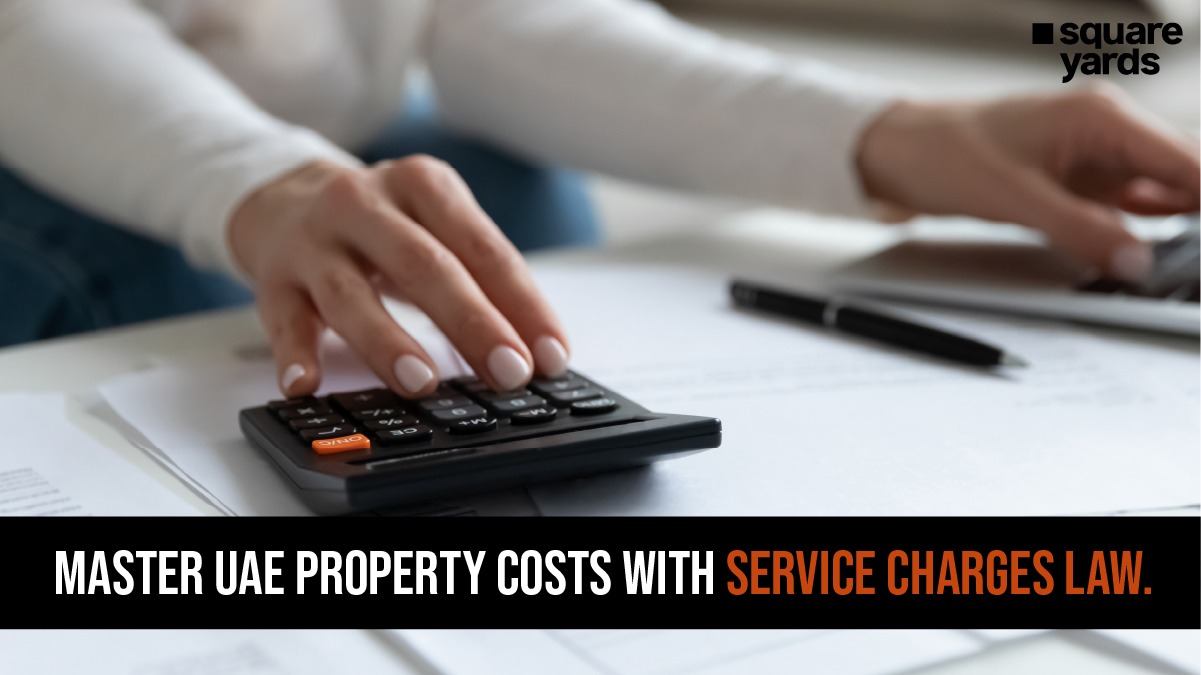Navigating the complexities of property management in the UAE requires a solid understanding of the Service Charge Law in UAE. From fee transparency to dispute resolution, knowing the key insights and requirements can help you stay compliant and protect your investment. Whether you’re a property owner or a developer, this law impacts how you manage and budget for communal expenses. Dive into the essential aspects of what Service Charge Law entails.
Decoding Service Charge Law in UAE

Service charges in UAE are essential to property ownership. They ensure the smooth operation and maintenance of shared facilities and common areas within a property. These charges are typically levied on property owners. They fund various services related to the common area of the property. Moreover, they contribute to the overall quality of life and functionality of the property. Service charges primarily cover the costs of maintaining and managing these common areas, including everything from cleaning and security to significant repairs and upgrades.
Service charges in UAE play a crucial role. Firstly, they preserve the value of a property. Additionally, they ensure that it remains attractive to current and potential residents. Without these charges, the quality of shared facilities could deteriorate. It can lead to a less desirable living environment and potentially reduce property values. Therefore, understanding the components and legal aspects of service charges is vital for both property owners and tenants.
Elements of Service Charges in the UAE
Service charges in UAE are comprehensive, encompassing a wide range of expenses necessary for the upkeep and management of common areas. Here are some of the key components:
- Maintenance: Regular maintenance is vital for keeping the property’s common areas in good condition. This includes routine inspections, repairs, and preventive measures to ensure that facilities like elevators, plumbing systems, and electrical installations function correctly.
- Security: Security services are a significant component of service charges, providing residents with peace of mind. These services include hiring security personnel, installing and maintaining surveillance systems, and ensuring controlled access to the property.
- Cleaning: It is crucial to maintain cleanliness in shared spaces such as lobbies, hallways, parking areas, and recreational facilities. Cleaning services ensure these areas are hygienic and presentable, enhancing residents’ overall living experience.
- Utilities: Service charges often cover the cost of utilities for common areas, including water, electricity, and cooling. This ensures that shared spaces are well-lit, comfortable, and adequately ventilated.
- Repairs: Over time, common areas and facilities may require repairs due to wear and tear or unexpected damages. Service charges fund these repairs, ensuring prompt responses to maintain the property’s functionality and safety.
- Management Fees: Property management companies charge fees for their services, including administration, operation, and maintenance of common areas. These fees are a part of the service charges and cover the cost of hiring and managing the necessary personnel and resources.
- Sinking Fund: The authorities allocate a portion of the service charges UAE to a sinking fund. They use it for major repairs and replacements that they may require in the future. This fund helps prevent significant fluctuations in service charge fees and ensures that the property remains maintained at a high standard.
Essential Points of Law Number 6 of 2019 on Service Charges

This Service Charge Law in UAE outlines the responsibility for service charges in jointly owned properties in Dubai, clearly defining the obligations of both owners and developers. It ensures that all units, whether sold or unsold, contribute fairly to the average service charge for the maintenance of common areas. Additionally, the law mandates transparency in the collection and use of UAE landlord service charges, with oversight provided by the Real Estate Regulatory Agency (RERA).
-
Obligations for Service Charge Payments
According to service charges law UAE 2024, under Law Number 6 of 2019 on Ownership of Jointly Owned Property in Dubai, the responsibility for service charges typically falls on the property owner. However, the rental agreement between the owner and tenant can specify different arrangements. For instance, some rental agreements may stipulate that the tenant is responsible for paying the service charges. In such cases, both parties must understand their obligations clearly. Suppose the tenant fails to pay the agreed-upon service charges. In that case, the ultimate responsibility still lies with the owner. They must ensure consumers pay these charges to maintain the property’s upkeep.
This law ensures that there is a clear framework for the payment of service charges, reducing the likelihood of disputes between owners and tenants. It is essential for property owners to carefully review their rental agreements. This ensures that all service charge terms are clear to both parties.
-
Service Charge Duties for Unsold Units
In the case of unsold units, the developer is responsible for paying the service charges. This ensures that the maintenance of a new development’s common areas and facilities from the outset. This provides a welcoming environment for potential buyers. Additionally, if the sale contract specifies that the developer will cover the service charges in UAE for a certain period after the sale, the developer must honour this commitment.
This provision helps protect buyers from unexpected costs. That goes immediately after purchasing a property. Additionally, it ensures that the development remains in good condition. It also places a responsibility on developers to manage their projects effectively and maintain high standards.
-
Allocation of Service Charges and Management Fees
Management fees are an integral part of the service charges and cover the costs associated with property management services. These services under the Service Charge Law in UAE include the overall administration of the property, coordination of maintenance and repairs, and handling of any issues. The management company is responsible for ensuring the maintenance of a property and efficient distribution of services.
Authorities provide a detailed breakdown of service charges to property owners, offering transparency and clarity on how they use the funds. This breakdown helps owners understand the allocation of their contributions and ensures accountability in managing their property. Property owners must review these statements regularly and raise any concerns or questions with the management company.
Comparing Service Charges Across the Emirates
Service charges UAE rights and duties can vary significantly between different emirates in the UAE. While Dubai has specific laws governing service charges, other emirates might have different rules or standards. Understanding these differences is crucial for property owners and tenants, especially those who own or manage properties in multiple emirates.
For example, service charges in Abu Dhabi might be calculated differently from those service charges in Dubai, and the types of expenses covered could vary. In some emirates, there might be additional regulations or requirements that property owners need to comply with. It is important to research and understand the specific regulations in each emirate to ensure compliance and avoid any legal issues.
Your Rights and Duties as per the Service Charge Law in UAE
Property owners are entitled to transparency regarding service charges and have the right to dispute unjust fees. At the same time, they are obligated to pay the charges as outlined.
-
Resident Rights Regarding Service Charges
Residents in the UAE have specific rights related to service charges, ensuring transparency and fairness. One of the key rights is the ability to access detailed information about how their service charges are being used. Residents can request a breakdown of expenses from the property management company and review how funds are allocated for maintenance, repairs, and other services.
Additionally, residents have the right to dispute any charges they believe are incorrect or unfair. Suppose a resident feels that the service charges are not being used appropriately or that there are discrepancies in the billing. In that case, they can raise their concerns with the property management company. If the issue is not resolved, residents can escalate the matter to the Real Estate Regulatory Agency (RERA) for further investigation and resolution.
-
Responsibilities of Landlord and Owner
Property owners are legally obligated to pay service charges UAE, even if the responsibility for service charges is assigned to the tenant under the rental agreement. This ensures that the property remains well-maintained and that essential services are not interrupted. Owners must ensure that service charges are paid on time and in full to avoid any penalties or legal actions.
If a tenant fails to pay the service charges, the owner must cover the cost. They may then seek reimbursement from the tenant as per the terms of the rental agreement. It is crucial for property owners to keep track of payments. They must ensure that all financial obligations related to service charges are met promptly.
How to Handle Disputes?
Disputes regarding service charges in UAE can arise, and it is essential to follow a structured process to resolve them effectively. Here are the steps to take in case of disagreements:
- Request Detailed Information: The first step is to ask the property management company for a detailed breakdown of the service charges. This breakdown should clarify how the funds are being used and help identify any discrepancies.
- Discuss with Management: It is advisable to discuss the issues directly with the property management company. Many disputes can be resolved through open communication and a mutual understanding of the charges.
- File a Complaint with RERA: One should discuss unresolved issues with the management company. The next step is to file a complaint with the Real Estate Regulatory Agency. RERA can investigate the matter and help you resolve the dispute.
- Legal Action: As a last resort, legal action can be taken to resolve the dispute. This may involve going to court to seek a resolution. It is important to have all relevant documentation and evidence to support your case if legal action becomes necessary.
Wrapping-Up
Understanding service charges in UAE and the associated laws is crucial for property owners and tenants in the UAE. These charges ensure that common areas and facilities are well-maintained, contributing to a pleasant and functional living environment. Knowing your rights and responsibilities is crucial. Under the Service Charge Law in UAE, one can maintain transparency and accountability in managing service charges.
For property owners, it is essential to review rental agreements carefully. Also, they must ensure that service charges are paid on time, and address any disputes promptly. Tenants should also be aware of their rights and responsibilities regarding service charges and seek clarification if needed. Following Service Charge Law in UAE allows property owners and tenants to contribute to the effective management and well-being of their properties.
Similar Suggestions For You:
|
Illegal Rental Increase Notice in Dubai |
|
|
Explore Tasheel Services in Dubai |
|
|
Legal Consequences of Bank Defaulters in UAE |
|
|
Guide to UAE Unemployment Insurance Scheme |
|
|
About The New Labour Law in UAE |
Frequently Asked Questions (FAQ’s)
Service charges in UAE apartments cover the maintenance, security, and upkeep of common areas and facilities. They typically include costs for cleaning, landscaping, utilities, security, and management fees.
Service charges in Dubai are calculated based on the property’s size (per square foot) and the estimated budget for maintaining the common areas. The Dubai Land Department (DLD) approves these charges annually.
The developer is responsible for paying service charges for unsold units. This includes covering costs for the common areas associated with these units, and ensuring that all shared facilities are adequately maintained.
DIFC service charges are set annually and cover maintenance, security, utilities, and management of common areas within the DIFC. Rates vary based on the type of property and its size.
The Dubai Land Department’s Real Estate Regulatory Agency (RERA) handles service charge disputes through the Dubai Rental Dispute Settlement Center. They mediate between property owners and developers to resolve disagreements. What are the service charges in UAE apartments?
How do you calculate service charges in Dubai?
What are the service charges for unsold units in Dubai?
What are the Dubai International Financial Center (DIFC) service charges?
What is the Service charges dispute resolution authority in Dubai?




